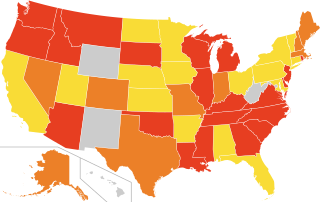
Proposition 22 was a law enacted by California voters in March 2000 to prevent marriage between same-sex couples. In May 2008, it was struck down by the California Supreme Court as contrary to the state constitution.
Felony petty theft is the colloquial term for a statute in the California Penal Code that makes it possible for a person who commits the crime of petty theft to be charged with a felony rather than a misdemeanor if the accused had previously been convicted of a theft-related crime at any time in the past. The technical name for the charge is petty theft with a prior.
In the United States, habitual offender laws were first implemented on March 7, 1994 and are part of the United States Justice Department's Anti-Violence Strategy. These laws require a person guilty of committing both a severe violent felony and two other previous convictions to serve a mandatory life sentence in prison. The purpose of the laws is to drastically increase the punishment of those convicted of more than two serious crimes.

In California, a ballot proposition can be a referendum or an initiative measure that is submitted to the electorate for a direct decision or direct vote. If passed, it can alter one or more of the articles of the Constitution of California, one or more of the 29 California Codes, or another law in the California Statutes by clarifying current or adding statute(s) or removing current statute(s).

Horse meat forms a significant part of the culinary traditions of many countries, particularly in Europe, South America and Asia. The top eight countries consume about 4.7 million horses a year. For the majority of humanity's early existence, wild horses were hunted as a source of protein.
Horse slaughter is the practice of slaughtering horses to produce meat for consumption. Humans have long consumed horse meat; the oldest known cave art, the 30,000-year-old paintings in France's Chauvet Cave, depict horses with other wild animals hunted by humans. Equine domestication is believed to have begun to raise horses for human consumption. The practice has become controversial in some parts of the world due to several concerns: whether horses are managed humanely in industrial slaughter; whether horses not raised for consumption yield safe meat, and whether it is appropriate to consume a companion animal.

California Proposition 36, the Substance Abuse and Crime Prevention Act of 2000, was an initiative statute that permanently changed state law to allow qualifying defendants convicted of non-violent drug possession offenses to receive a probationary sentence in lieu of incarceration. As a condition of probation defendants are required to participate in and complete a licensed and/or certified community drug treatment program. If the defendant fails to complete this program or violates any other term or condition of their probation, then probation can be revoked and the defendant may be required to serve an additional sentence which may include incarceration. The proposition was passed with 6,233,422 (60.86%) votes in favor and 4,009,508 (39.14%) against on November 7, 2000 and went into effect on July 1, 2001 with $120 million for treatment services allocated annually for five years. The act is codified in sections 1210 and 3063.1 of the California Penal Code and Division 10.8 of the California Health and Safety Code.
Drug policy of California refers to the policy on various classes and kinds of drugs in the U.S. state of California. Cannabis possession has been decriminalized and is soon to be legalised following legislation changes, but its cultivation and sale remain criminal offenses, along with the possession, sale, and manufacture of harder drugs such as methamphetamine and cocaine. With respect to many controlled substances, terms such as illegal and prohibited do not include their authorized possession or sale as laid out by applicable laws.

California Proposition 6, also known as the Safe Neighborhoods Act and The Runner Initiative, is a statutory initiative that appeared on the November 2008 ballot in California. This proposition was rejected by voters on November 4 of that year.

Proposition 66 was a California ballot proposition on the November 2, 2004 ballot. It was a proposed amendment to the California three-strikes law. Prop 66 would have required the third felony charge against a suspect to be especially violent and/or serious crimes to mandate a 25-years-to-life sentence. It also would have changed the definition of some felonies. It was rejected by voters, with 52.7% voting against the proposition.

Proposition 8 was a law enacted by California voters on 8 June 1982, by means of the initiative process. The law restricted the rights of convicts, and those suspected of crimes, and extended the rights of victims. To do this it amended both the Constitution of California and ordinary statutes.
In the United States, the law regarding murder varies by jurisdiction. In most U.S. jurisdictions there is a hierarchy of acts, known collectively as homicide, of which first degree murder and felony murder are the most serious, followed by second degree murder, followed by voluntary manslaughter and involuntary manslaughter which are not as serious, and ending finally in justifiable homicide, which is not a crime at all. However, because there are at least 52 relevant jurisdictions, each with its own criminal code, this is a considerable simplification.

Oregon Ballot Measure 80, also known as the Oregon Cannabis Tax Act, OCTA and Initiative-9, was an initiated state statute ballot measure on the November 6, 2012 general election ballot in Oregon. It would have allowed personal marijuana and hemp cultivation or use without a license and created a commission to regulate the sale of commercial marijuana. The act would also have set aside two percent of profits from cannabis sales to promote industrial hemp, biodiesel, fiber, protein and oil.

The California state elections was held on Election Day, November 6, 2012. On the ballot were eleven propositions, various parties' nominees for the United States presidency, the Class I Senator to the United States Senate, all of California's seats to the House of Representatives, all of the seats of the State Assembly, and all odd-numbered seats of the State Senate.

Gun laws in Texas regulate the sale, possession, and use of firearms and ammunition in the U.S. state of Texas.

Legality of bestiality in the United States looks at the laws prohibiting bestiality in the United States of America. The legality of sex with animals has been steadily decreasing over the past 20 years. As of February 10, 2018, 45 states and 2 territories ban sex with animals, while 5 states and the District of Columbia have decriminalized it. In 2017, five states introduced legislation to ban bestiality, with Nevada, Vermont, and Texas enacting laws banning it in 2017. New Hampshire and Ohio also banned sex with animals in 2017.

Proposition 47, also known by its ballot title Criminal Sentences. Misdemeanor Penalties. Initiative Statute, was a referendum passed by voters in the state of California on November 4, 2014. The measure was also referred to by its supporters as the Safe Neighborhoods and Schools Act. It recategorized some nonviolent offenses as misdemeanors, rather than felonies, as they had previously been categorized.

Cannabis in New York is illegal for recreational use, but is permitted for medical use, and possession of small amounts is decriminalized.











